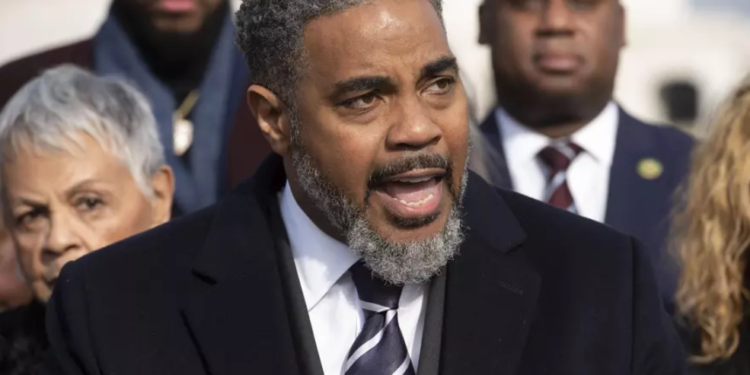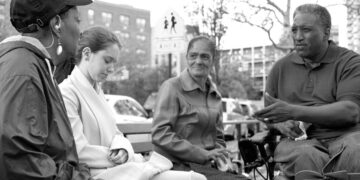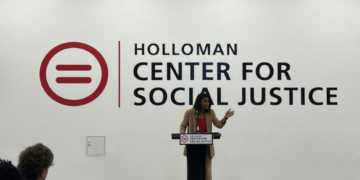Congressional Black Caucus Chairman Rep. Steven Horsford, D-Nev., addresses reporters on Capitol Hill in Washington, Feb. 7, 2023, discussing police reform. The Caucus urges federal scrutiny from the White House, Justice, and Education departments into Florida school districts’ compliance with federal law following controversial changes, including book bans and additions highlighting positive aspects of slavery. (AP Photo/Cliff Owen, File)
June 26, 2024 Story by: Editor
Amid rising concerns over President Biden’s economic policies, the Congressional Black Caucus (CBC) convened in Washington last week to chart a course for the 2024 election and beyond. The conference focused on addressing economic challenges within the Black community, emphasizing economic empowerment over non-economic demands previously highlighted by other civil rights groups like the NAACP.
The CBC’s conference featured panels centered on economic issues, reflecting an urgent need to address barriers to prosperity for many Black Americans. Historical disparities persist in wealth, wages, employment, and workforce participation, with a significant wealth gap and stunted middle-class growth remaining largely unchanged, as noted by the Economic Policy Institute’s 2013 symposium, The Unfinished March.
One of the primary goals discussed was dismantling racial barriers in the private sector, with strong support for diversity, equity, and inclusion (DEI) policies. Rep. Steven Horsford (D-Nev.), CBC chairman, proposed a congressional resolution requiring large corporations to be transparent about their DEI efforts and publish annual reports on their goals and progress. “We cannot have Black economic mobility without dealing with the DEI question,” Horsford asserted. “This is a clarion call to hold the line on DEI in the private sector, in schools, and in government — and to expand the vision for creating true Black wealth.”
Another critical discussion focused on inclusive hiring and contracting under federal infrastructure projects. With significant investments from the Inflation Reduction Act and the Infrastructure Investment and Jobs Act, the CBC aims to ensure that these projects hire and train thousands of Black workers in an industry that has historically excluded them. Mayor Wayne Messam of Miramar, Fla., highlighted the challenges posed by the racial culture of the construction industry and resistant state Republican administrations, advocating for strong equity standards in federal contracts and innovative recruiting methods.
Tonya Hicks, founder of Power Solutions Inc., proposed adjustments to the bidding process for infrastructure projects to give small, minority-owned companies a better chance. She suggested limiting project scales, separating union and non-union projects, and reconsidering bond and insurance requirements.
Rep. Gregory Meeks (D-N.Y.) emphasized the importance of Black-owned investment funds holding equity stakes in urban redevelopment projects, suggesting a 30% requirement.
However, the conference overlooked several potential strategies for economic development. It did not address the benefits of cooperative strategies among Black institutions like Historically Black Colleges and Universities, churches, and professional associations. It also missed the potential of strategic migration to politically and economically promising southern states, and the need for a coordinated approach to reparations, focusing on institutional wealth rather than individual restitution.
Despite these omissions, the CBC has firmly placed economic justice on the political agenda for 2024. Reflecting on the insights of the late social psychologist Amos Wilson in his 1998 study, Blueprint for Black Power: A Moral, Political and Economic Imperative for the Twenty-First Century, may provide valuable guidance. Wilson warned that “Black politics and activism without the Black ownership of and control over primary forms and bases of power such as property, wealth, and organization is the recipe for Black political and non-political powerlessness.”
Roger House, associate professor of American Studies at Emerson College and author of several books, including the forthcoming Five Hundred Years of Black Self Governance by Louisiana State University Press, shared these observations. Source: MSN

















